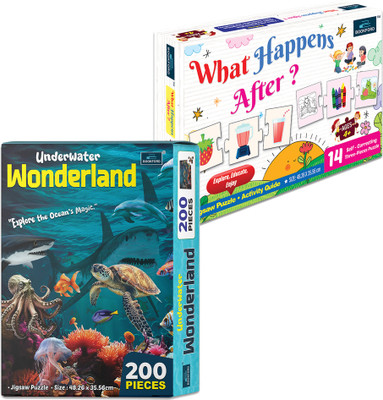BOOKFORD What Happens After & Underwater Wonderland Puzzles | Set of 2(242 Pieces)
Quick Overview
Product Price Comparison
Jigsaw puzzles have long been a favorite activity for children across age groups. Combining fun with learning, these puzzles offer a well-rounded way for young minds to grow and explore. Whether itŌĆÖs solving a colorful animal puzzle, discovering planets through a solar system theme, or piecing together a dinosaur scene, jigsaw puzzles keep children engaged while boosting essential life skills.One of the greatest benefits of jigsaw puzzles is their ability to strengthen cognitive development. When a child tries to fit different pieces together, they learn to think critically, recognize patterns, and develop logical reasoning. These mental exercises are vital for early brain development and directly contribute to academic success in subjects like math and science.In addition to mental growth, jigsaw puzzles help improve fine motor skills. Picking up and placing pieces requires hand-eye coordination, finger strength, and dexterity. As children manipulate small shapes to fit into a larger whole, they become more confident in using their hands and improve their ability to focus on details.Another important aspect of puzzle-solving is its positive effect on memory and concentration. Children often refer back to the picture on the box, remember the shapes and colors of different pieces, and try to recall where each one might fit. This process enhances both short-term memory and long-term retention skills.Jigsaw puzzles also encourage patience and perseverance. Unlike instant digital games, puzzles require children to slow down, observe carefully, and try again when something doesnŌĆÖt work. This teaches resilience, an important life skill that helps children cope with challenges in school and beyond.Socially, puzzles can be a great tool for interaction. When solved in groups or with family members, children learn teamwork, communication, and problem-solving through cooperation. Parents can use puzzles as a bonding activity that promotes shared learning and quality time.In terms of variety, there is no shortage of puzzle themes available for children. From dinosaurs, outer space, and underwater worlds to fairy tales, community helpers, animals, and festivals, puzzles can be tailored to a childŌĆÖs interests and learning goals. This flexibility makes them ideal for both home use and educational settings.When choosing a jigsaw puzzle for kids, it's important to consider the age-appropriateness of the piece count, the theme, and the size of the pieces. Younger children benefit from larger, simpler puzzles, while older children enjoy more complex designs with greater piece counts. Quality is also keyŌĆöpuzzles should be made from durable, child-safe materials with non-toxic printing and smooth edges.


